Analyzing the Impact of Talent Management on HR in Business
VerifiedAdded on 2022/12/29
|32
|6671
|310
Report
AI Summary
This report investigates the influence of talent management on the human resources (HR) function, particularly within Unilever. It explores the significance of talent management, including attraction, development, and retention of employees, and its impact on business performance. The report examines the role of HR in managing talent, the importance of training and development, and issues businesses face in this area. It reviews relevant literature, discusses research methodology incorporating positivism and interpretivism, and analyzes data collected through survey research. The analysis covers the identification of talent management's importance, its impact on business performance, and potential barriers. The report concludes with recommendations for improving talent management strategies, including effective acquisition, technology solutions, and communication campaigns. The report also includes a reflection on alternative research methodologies.
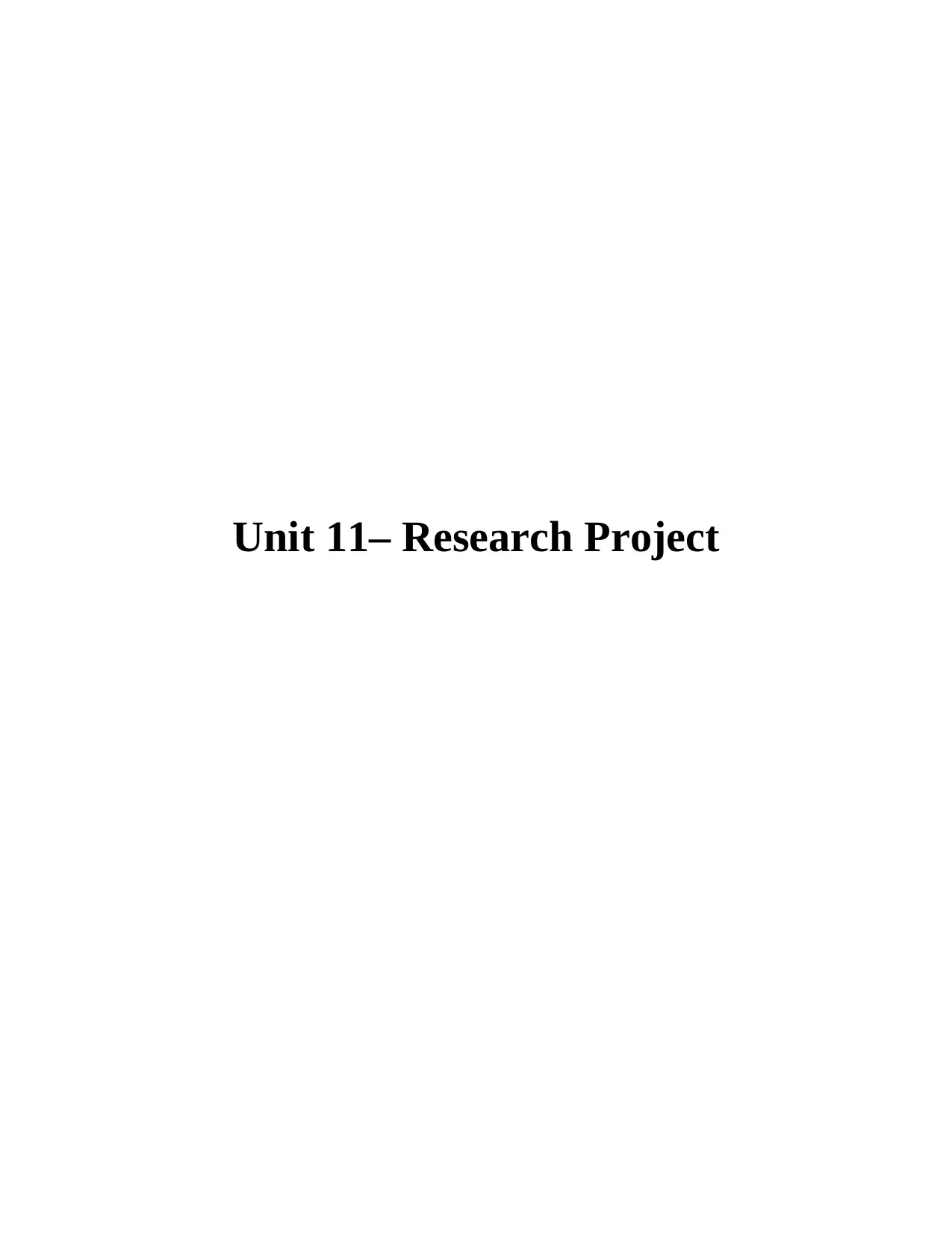
Unit 11– Research Project
Paraphrase This Document
Need a fresh take? Get an instant paraphrase of this document with our AI Paraphraser
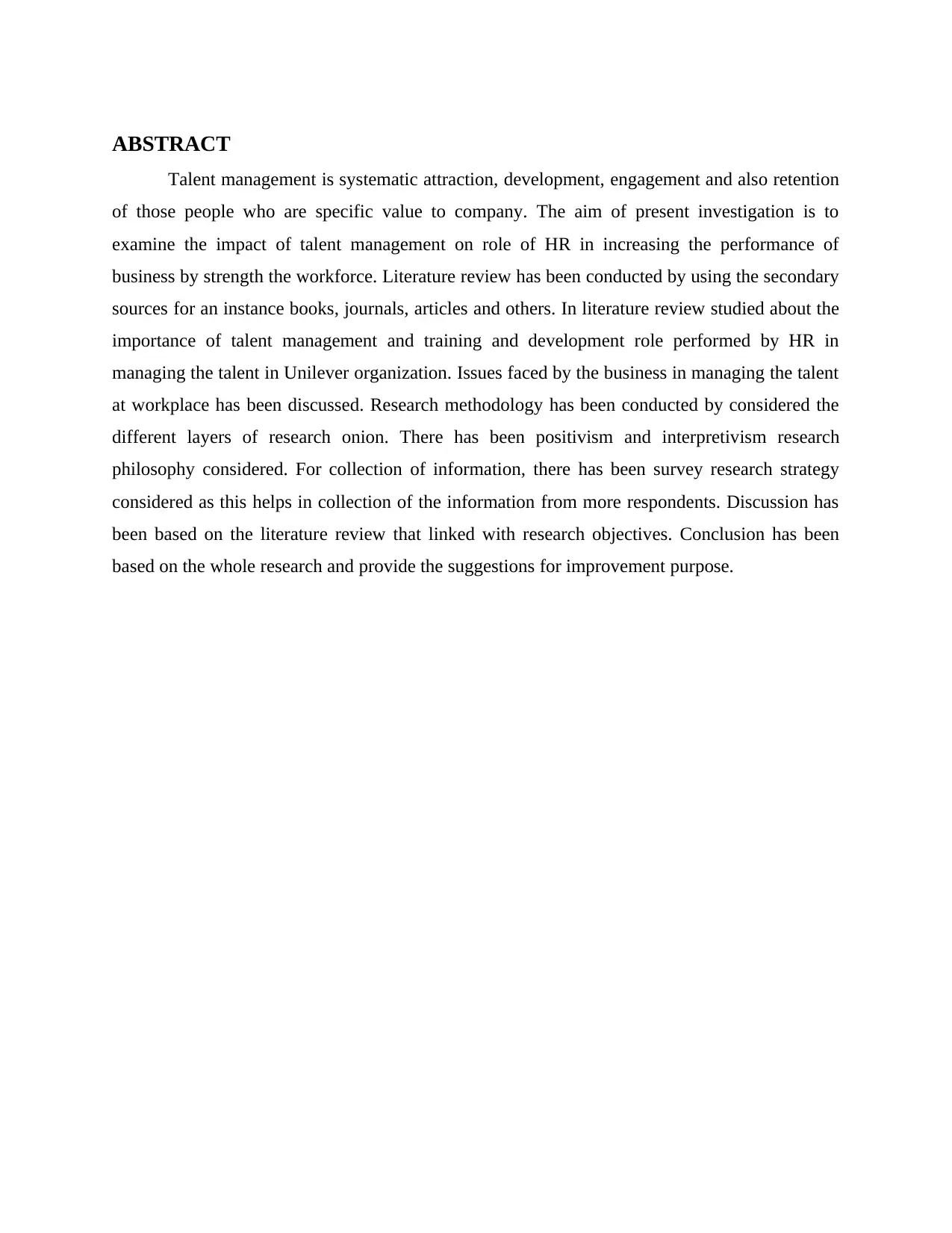
ABSTRACT
Talent management is systematic attraction, development, engagement and also retention
of those people who are specific value to company. The aim of present investigation is to
examine the impact of talent management on role of HR in increasing the performance of
business by strength the workforce. Literature review has been conducted by using the secondary
sources for an instance books, journals, articles and others. In literature review studied about the
importance of talent management and training and development role performed by HR in
managing the talent in Unilever organization. Issues faced by the business in managing the talent
at workplace has been discussed. Research methodology has been conducted by considered the
different layers of research onion. There has been positivism and interpretivism research
philosophy considered. For collection of information, there has been survey research strategy
considered as this helps in collection of the information from more respondents. Discussion has
been based on the literature review that linked with research objectives. Conclusion has been
based on the whole research and provide the suggestions for improvement purpose.
Talent management is systematic attraction, development, engagement and also retention
of those people who are specific value to company. The aim of present investigation is to
examine the impact of talent management on role of HR in increasing the performance of
business by strength the workforce. Literature review has been conducted by using the secondary
sources for an instance books, journals, articles and others. In literature review studied about the
importance of talent management and training and development role performed by HR in
managing the talent in Unilever organization. Issues faced by the business in managing the talent
at workplace has been discussed. Research methodology has been conducted by considered the
different layers of research onion. There has been positivism and interpretivism research
philosophy considered. For collection of information, there has been survey research strategy
considered as this helps in collection of the information from more respondents. Discussion has
been based on the literature review that linked with research objectives. Conclusion has been
based on the whole research and provide the suggestions for improvement purpose.
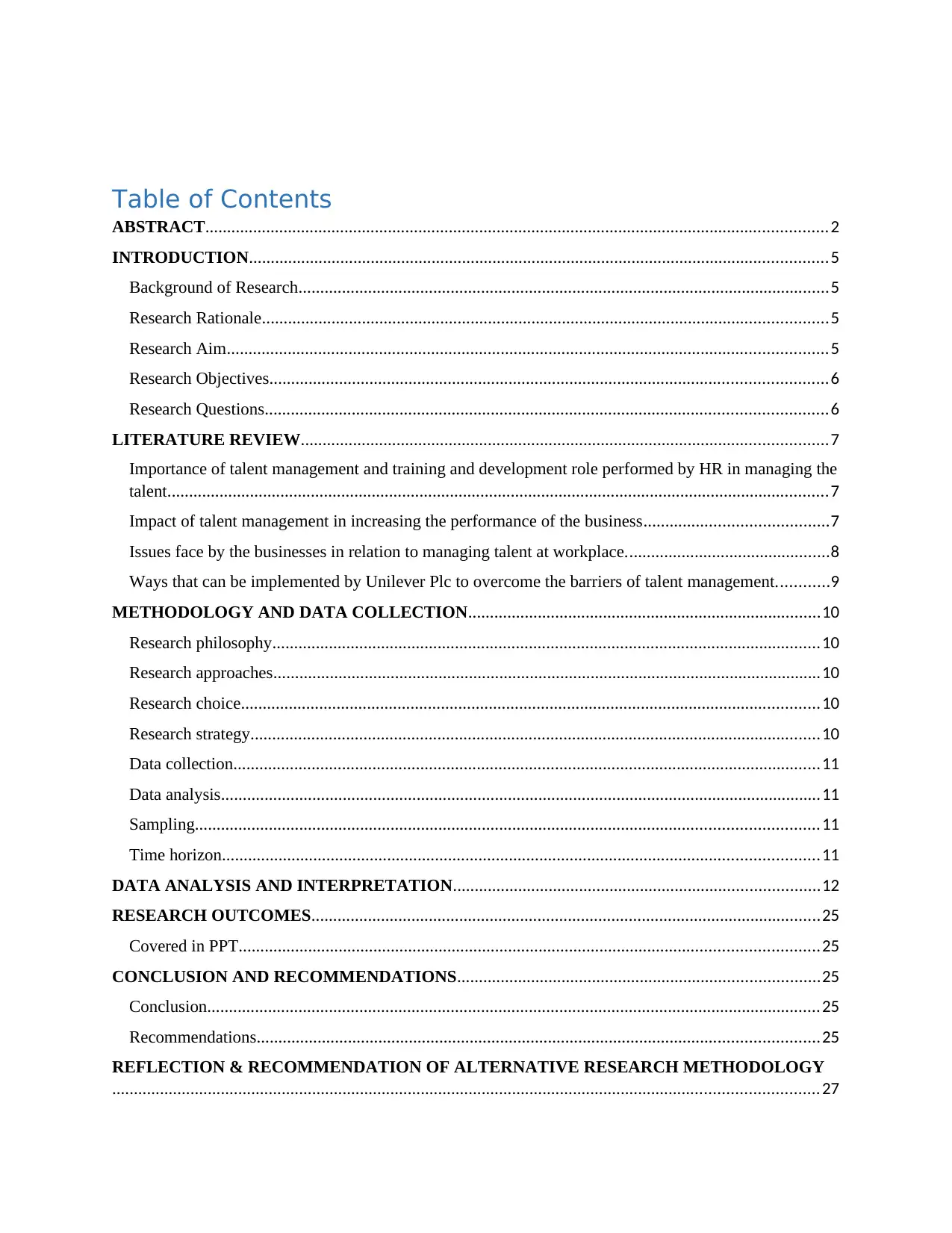
Table of Contents
ABSTRACT...............................................................................................................................................2
INTRODUCTION.....................................................................................................................................5
Background of Research..........................................................................................................................5
Research Rationale..................................................................................................................................5
Research Aim..........................................................................................................................................5
Research Objectives................................................................................................................................6
Research Questions.................................................................................................................................6
LITERATURE REVIEW.........................................................................................................................7
Importance of talent management and training and development role performed by HR in managing the
talent........................................................................................................................................................7
Impact of talent management in increasing the performance of the business..........................................7
Issues face by the businesses in relation to managing talent at workplace...............................................8
Ways that can be implemented by Unilever Plc to overcome the barriers of talent management............9
METHODOLOGY AND DATA COLLECTION.................................................................................10
Research philosophy..............................................................................................................................10
Research approaches..............................................................................................................................10
Research choice.....................................................................................................................................10
Research strategy...................................................................................................................................10
Data collection.......................................................................................................................................11
Data analysis..........................................................................................................................................11
Sampling...............................................................................................................................................11
Time horizon.........................................................................................................................................11
DATA ANALYSIS AND INTERPRETATION....................................................................................12
RESEARCH OUTCOMES.....................................................................................................................25
Covered in PPT.....................................................................................................................................25
CONCLUSION AND RECOMMENDATIONS...................................................................................25
Conclusion.............................................................................................................................................25
Recommendations.................................................................................................................................25
REFLECTION & RECOMMENDATION OF ALTERNATIVE RESEARCH METHODOLOGY
.................................................................................................................................................................. 27
ABSTRACT...............................................................................................................................................2
INTRODUCTION.....................................................................................................................................5
Background of Research..........................................................................................................................5
Research Rationale..................................................................................................................................5
Research Aim..........................................................................................................................................5
Research Objectives................................................................................................................................6
Research Questions.................................................................................................................................6
LITERATURE REVIEW.........................................................................................................................7
Importance of talent management and training and development role performed by HR in managing the
talent........................................................................................................................................................7
Impact of talent management in increasing the performance of the business..........................................7
Issues face by the businesses in relation to managing talent at workplace...............................................8
Ways that can be implemented by Unilever Plc to overcome the barriers of talent management............9
METHODOLOGY AND DATA COLLECTION.................................................................................10
Research philosophy..............................................................................................................................10
Research approaches..............................................................................................................................10
Research choice.....................................................................................................................................10
Research strategy...................................................................................................................................10
Data collection.......................................................................................................................................11
Data analysis..........................................................................................................................................11
Sampling...............................................................................................................................................11
Time horizon.........................................................................................................................................11
DATA ANALYSIS AND INTERPRETATION....................................................................................12
RESEARCH OUTCOMES.....................................................................................................................25
Covered in PPT.....................................................................................................................................25
CONCLUSION AND RECOMMENDATIONS...................................................................................25
Conclusion.............................................................................................................................................25
Recommendations.................................................................................................................................25
REFLECTION & RECOMMENDATION OF ALTERNATIVE RESEARCH METHODOLOGY
.................................................................................................................................................................. 27
⊘ This is a preview!⊘
Do you want full access?
Subscribe today to unlock all pages.

Trusted by 1+ million students worldwide
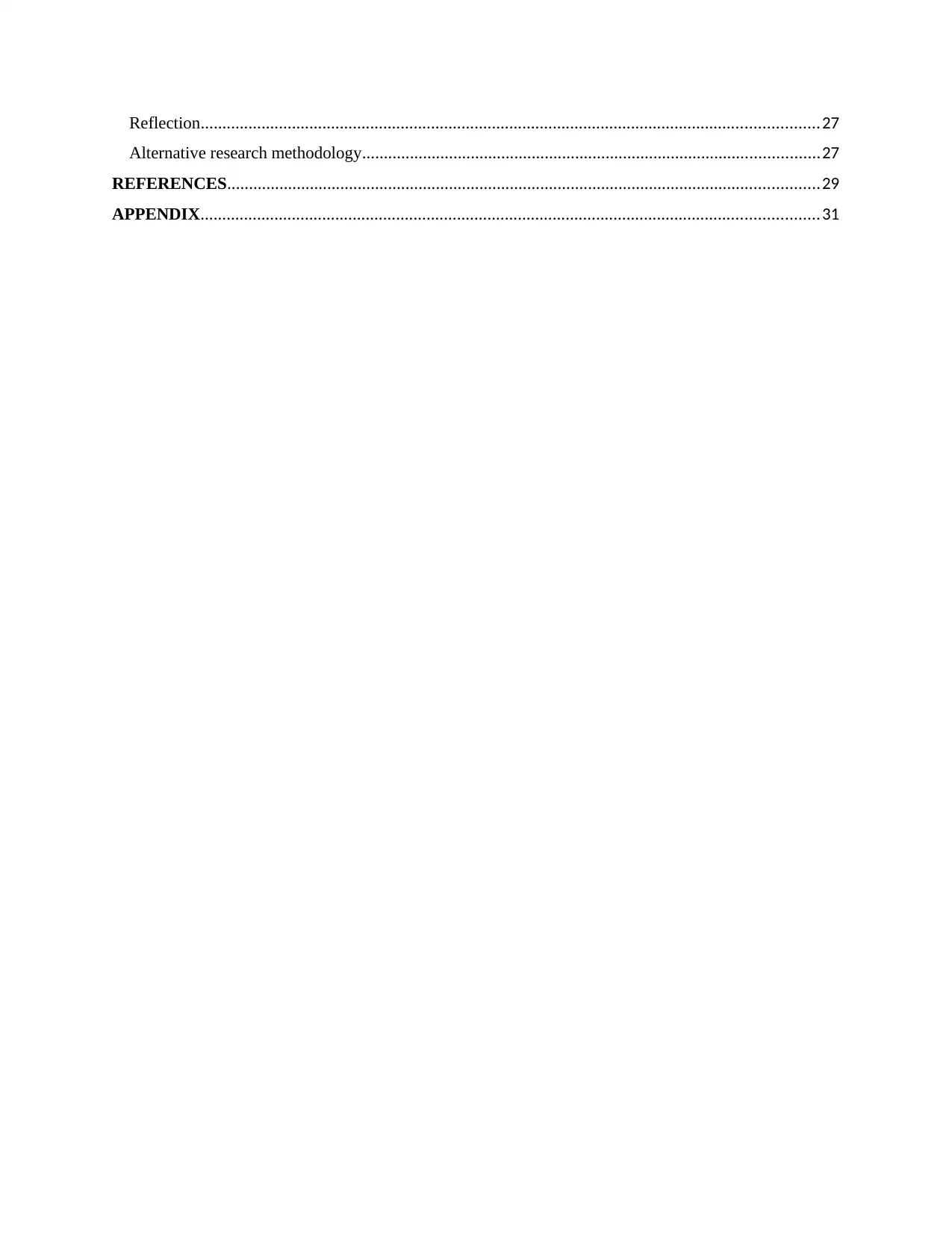
Reflection..............................................................................................................................................27
Alternative research methodology.........................................................................................................27
REFERENCES........................................................................................................................................29
APPENDIX..............................................................................................................................................31
Alternative research methodology.........................................................................................................27
REFERENCES........................................................................................................................................29
APPENDIX..............................................................................................................................................31
Paraphrase This Document
Need a fresh take? Get an instant paraphrase of this document with our AI Paraphraser
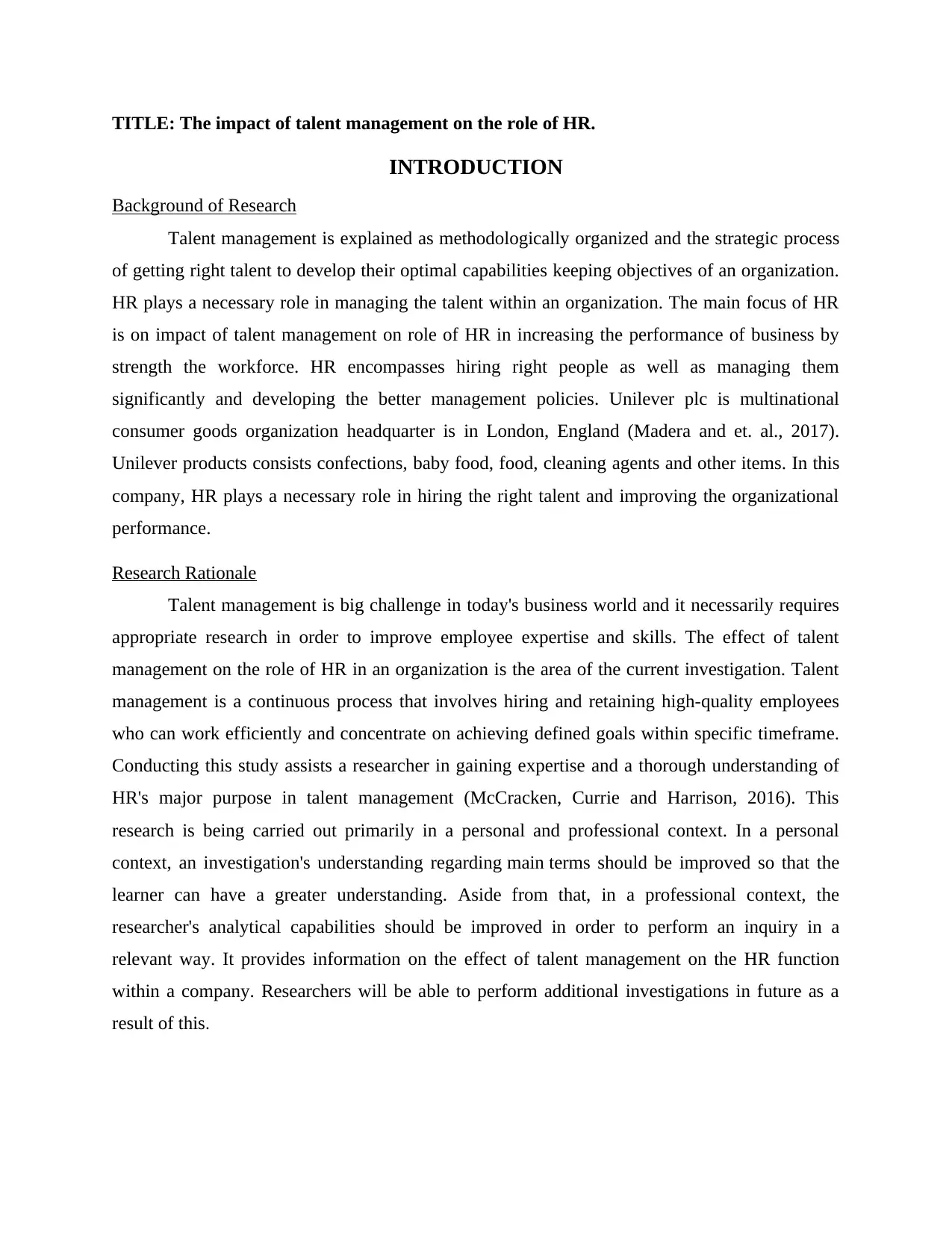
TITLE: The impact of talent management on the role of HR.
INTRODUCTION
Background of Research
Talent management is explained as methodologically organized and the strategic process
of getting right talent to develop their optimal capabilities keeping objectives of an organization.
HR plays a necessary role in managing the talent within an organization. The main focus of HR
is on impact of talent management on role of HR in increasing the performance of business by
strength the workforce. HR encompasses hiring right people as well as managing them
significantly and developing the better management policies. Unilever plc is multinational
consumer goods organization headquarter is in London, England (Madera and et. al., 2017).
Unilever products consists confections, baby food, food, cleaning agents and other items. In this
company, HR plays a necessary role in hiring the right talent and improving the organizational
performance.
Research Rationale
Talent management is big challenge in today's business world and it necessarily requires
appropriate research in order to improve employee expertise and skills. The effect of talent
management on the role of HR in an organization is the area of the current investigation. Talent
management is a continuous process that involves hiring and retaining high-quality employees
who can work efficiently and concentrate on achieving defined goals within specific timeframe.
Conducting this study assists a researcher in gaining expertise and a thorough understanding of
HR's major purpose in talent management (McCracken, Currie and Harrison, 2016). This
research is being carried out primarily in a personal and professional context. In a personal
context, an investigation's understanding regarding main terms should be improved so that the
learner can have a greater understanding. Aside from that, in a professional context, the
researcher's analytical capabilities should be improved in order to perform an inquiry in a
relevant way. It provides information on the effect of talent management on the HR function
within a company. Researchers will be able to perform additional investigations in future as a
result of this.
INTRODUCTION
Background of Research
Talent management is explained as methodologically organized and the strategic process
of getting right talent to develop their optimal capabilities keeping objectives of an organization.
HR plays a necessary role in managing the talent within an organization. The main focus of HR
is on impact of talent management on role of HR in increasing the performance of business by
strength the workforce. HR encompasses hiring right people as well as managing them
significantly and developing the better management policies. Unilever plc is multinational
consumer goods organization headquarter is in London, England (Madera and et. al., 2017).
Unilever products consists confections, baby food, food, cleaning agents and other items. In this
company, HR plays a necessary role in hiring the right talent and improving the organizational
performance.
Research Rationale
Talent management is big challenge in today's business world and it necessarily requires
appropriate research in order to improve employee expertise and skills. The effect of talent
management on the role of HR in an organization is the area of the current investigation. Talent
management is a continuous process that involves hiring and retaining high-quality employees
who can work efficiently and concentrate on achieving defined goals within specific timeframe.
Conducting this study assists a researcher in gaining expertise and a thorough understanding of
HR's major purpose in talent management (McCracken, Currie and Harrison, 2016). This
research is being carried out primarily in a personal and professional context. In a personal
context, an investigation's understanding regarding main terms should be improved so that the
learner can have a greater understanding. Aside from that, in a professional context, the
researcher's analytical capabilities should be improved in order to perform an inquiry in a
relevant way. It provides information on the effect of talent management on the HR function
within a company. Researchers will be able to perform additional investigations in future as a
result of this.
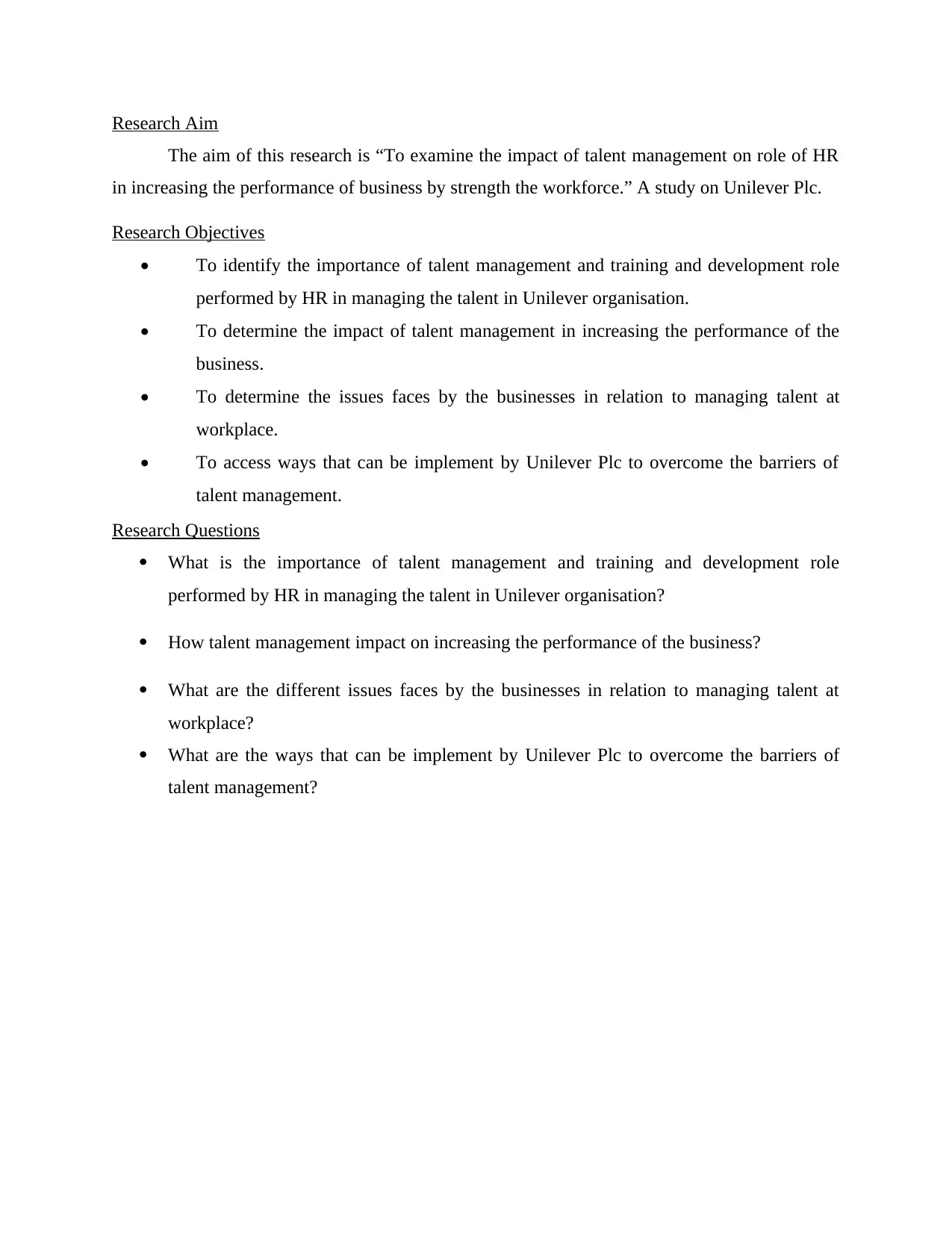
Research Aim
The aim of this research is “To examine the impact of talent management on role of HR
in increasing the performance of business by strength the workforce.” A study on Unilever Plc.
Research Objectives
• To identify the importance of talent management and training and development role
performed by HR in managing the talent in Unilever organisation.
• To determine the impact of talent management in increasing the performance of the
business.
• To determine the issues faces by the businesses in relation to managing talent at
workplace.
• To access ways that can be implement by Unilever Plc to overcome the barriers of
talent management.
Research Questions
What is the importance of talent management and training and development role
performed by HR in managing the talent in Unilever organisation?
How talent management impact on increasing the performance of the business?
What are the different issues faces by the businesses in relation to managing talent at
workplace?
What are the ways that can be implement by Unilever Plc to overcome the barriers of
talent management?
The aim of this research is “To examine the impact of talent management on role of HR
in increasing the performance of business by strength the workforce.” A study on Unilever Plc.
Research Objectives
• To identify the importance of talent management and training and development role
performed by HR in managing the talent in Unilever organisation.
• To determine the impact of talent management in increasing the performance of the
business.
• To determine the issues faces by the businesses in relation to managing talent at
workplace.
• To access ways that can be implement by Unilever Plc to overcome the barriers of
talent management.
Research Questions
What is the importance of talent management and training and development role
performed by HR in managing the talent in Unilever organisation?
How talent management impact on increasing the performance of the business?
What are the different issues faces by the businesses in relation to managing talent at
workplace?
What are the ways that can be implement by Unilever Plc to overcome the barriers of
talent management?
⊘ This is a preview!⊘
Do you want full access?
Subscribe today to unlock all pages.

Trusted by 1+ million students worldwide
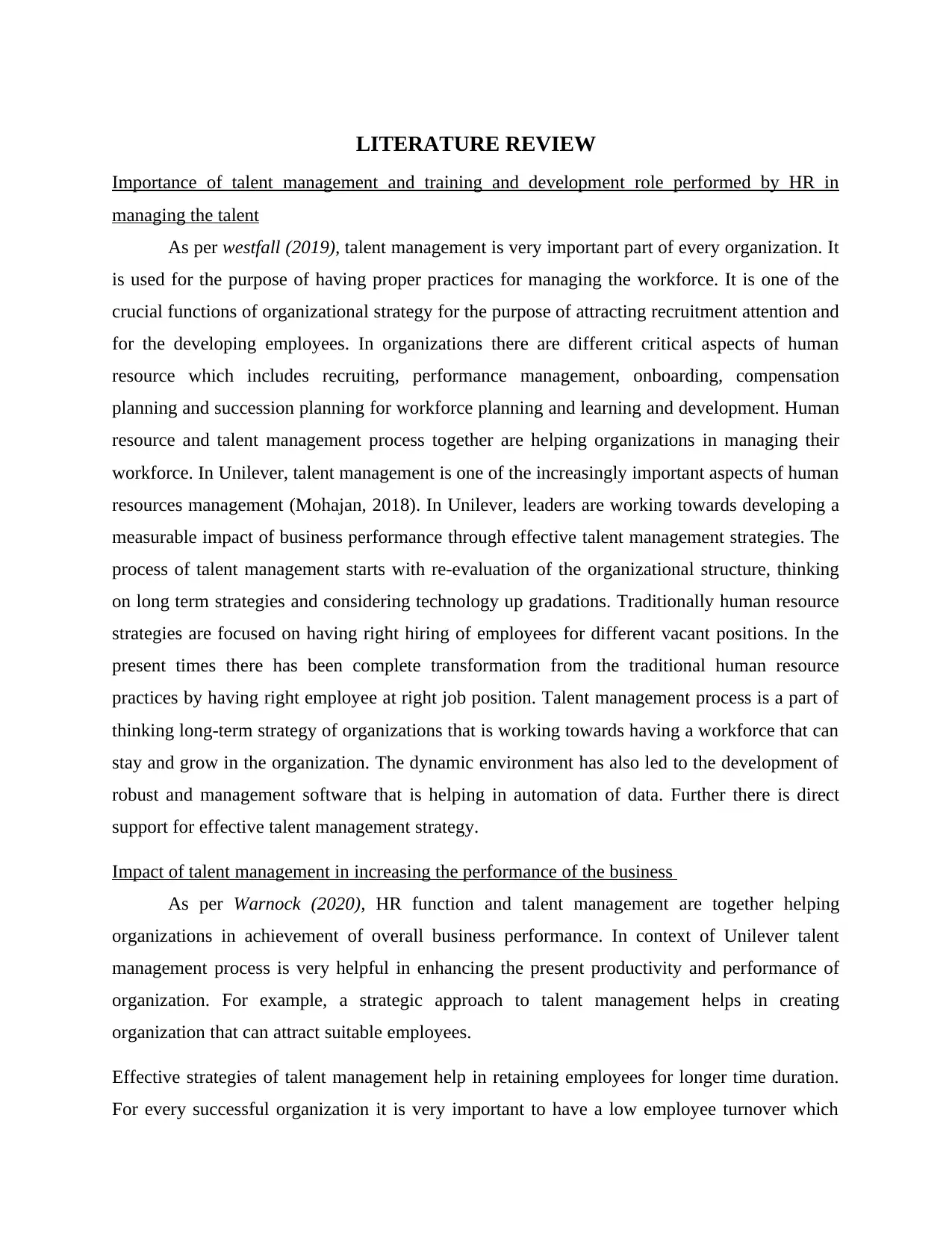
LITERATURE REVIEW
Importance of talent management and training and development role performed by HR in
managing the talent
As per westfall (2019), talent management is very important part of every organization. It
is used for the purpose of having proper practices for managing the workforce. It is one of the
crucial functions of organizational strategy for the purpose of attracting recruitment attention and
for the developing employees. In organizations there are different critical aspects of human
resource which includes recruiting, performance management, onboarding, compensation
planning and succession planning for workforce planning and learning and development. Human
resource and talent management process together are helping organizations in managing their
workforce. In Unilever, talent management is one of the increasingly important aspects of human
resources management (Mohajan, 2018). In Unilever, leaders are working towards developing a
measurable impact of business performance through effective talent management strategies. The
process of talent management starts with re-evaluation of the organizational structure, thinking
on long term strategies and considering technology up gradations. Traditionally human resource
strategies are focused on having right hiring of employees for different vacant positions. In the
present times there has been complete transformation from the traditional human resource
practices by having right employee at right job position. Talent management process is a part of
thinking long-term strategy of organizations that is working towards having a workforce that can
stay and grow in the organization. The dynamic environment has also led to the development of
robust and management software that is helping in automation of data. Further there is direct
support for effective talent management strategy.
Impact of talent management in increasing the performance of the business
As per Warnock (2020), HR function and talent management are together helping
organizations in achievement of overall business performance. In context of Unilever talent
management process is very helpful in enhancing the present productivity and performance of
organization. For example, a strategic approach to talent management helps in creating
organization that can attract suitable employees.
Effective strategies of talent management help in retaining employees for longer time duration.
For every successful organization it is very important to have a low employee turnover which
Importance of talent management and training and development role performed by HR in
managing the talent
As per westfall (2019), talent management is very important part of every organization. It
is used for the purpose of having proper practices for managing the workforce. It is one of the
crucial functions of organizational strategy for the purpose of attracting recruitment attention and
for the developing employees. In organizations there are different critical aspects of human
resource which includes recruiting, performance management, onboarding, compensation
planning and succession planning for workforce planning and learning and development. Human
resource and talent management process together are helping organizations in managing their
workforce. In Unilever, talent management is one of the increasingly important aspects of human
resources management (Mohajan, 2018). In Unilever, leaders are working towards developing a
measurable impact of business performance through effective talent management strategies. The
process of talent management starts with re-evaluation of the organizational structure, thinking
on long term strategies and considering technology up gradations. Traditionally human resource
strategies are focused on having right hiring of employees for different vacant positions. In the
present times there has been complete transformation from the traditional human resource
practices by having right employee at right job position. Talent management process is a part of
thinking long-term strategy of organizations that is working towards having a workforce that can
stay and grow in the organization. The dynamic environment has also led to the development of
robust and management software that is helping in automation of data. Further there is direct
support for effective talent management strategy.
Impact of talent management in increasing the performance of the business
As per Warnock (2020), HR function and talent management are together helping
organizations in achievement of overall business performance. In context of Unilever talent
management process is very helpful in enhancing the present productivity and performance of
organization. For example, a strategic approach to talent management helps in creating
organization that can attract suitable employees.
Effective strategies of talent management help in retaining employees for longer time duration.
For every successful organization it is very important to have a low employee turnover which
Paraphrase This Document
Need a fresh take? Get an instant paraphrase of this document with our AI Paraphraser
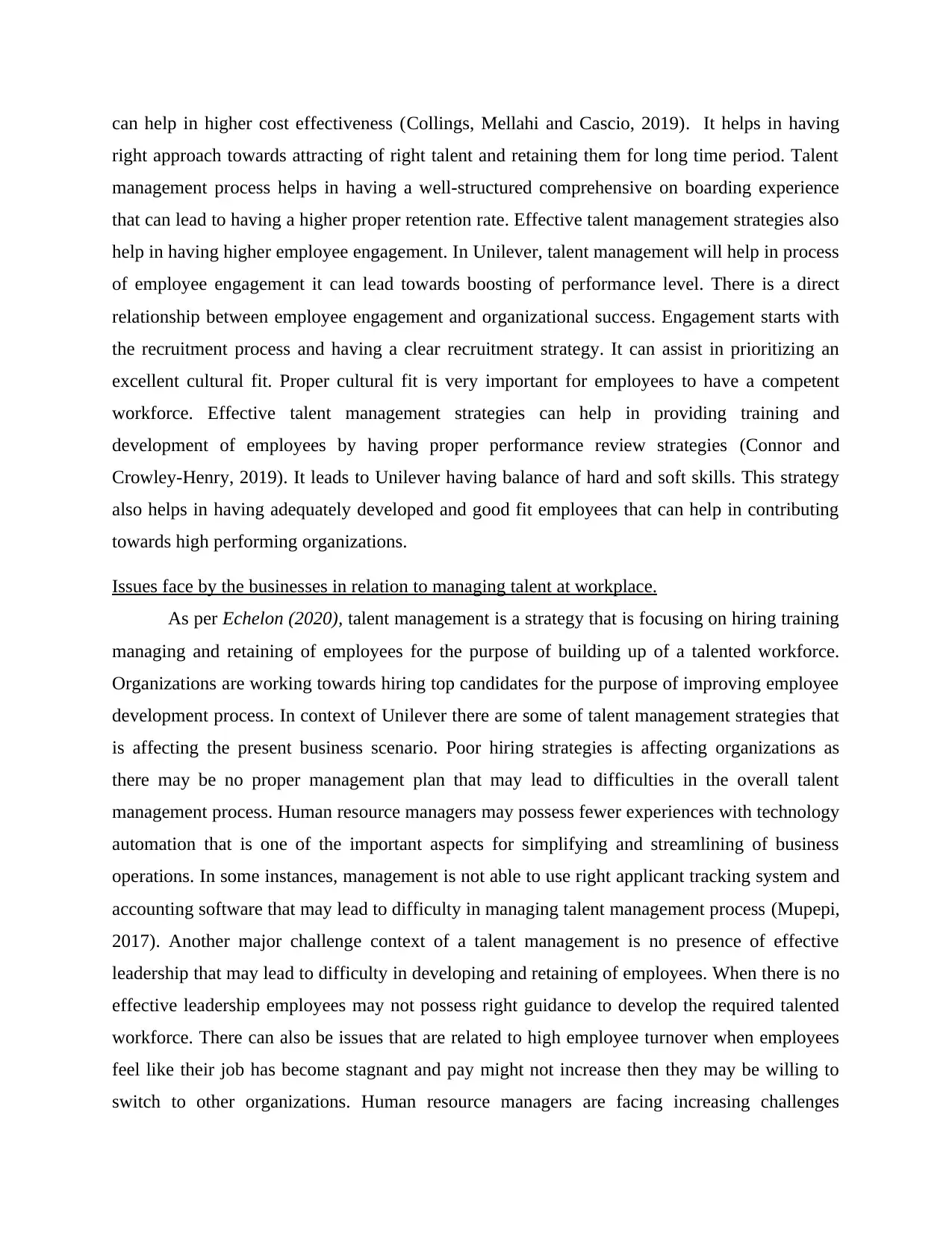
can help in higher cost effectiveness (Collings, Mellahi and Cascio, 2019). It helps in having
right approach towards attracting of right talent and retaining them for long time period. Talent
management process helps in having a well-structured comprehensive on boarding experience
that can lead to having a higher proper retention rate. Effective talent management strategies also
help in having higher employee engagement. In Unilever, talent management will help in process
of employee engagement it can lead towards boosting of performance level. There is a direct
relationship between employee engagement and organizational success. Engagement starts with
the recruitment process and having a clear recruitment strategy. It can assist in prioritizing an
excellent cultural fit. Proper cultural fit is very important for employees to have a competent
workforce. Effective talent management strategies can help in providing training and
development of employees by having proper performance review strategies (Connor and
Crowley-Henry, 2019). It leads to Unilever having balance of hard and soft skills. This strategy
also helps in having adequately developed and good fit employees that can help in contributing
towards high performing organizations.
Issues face by the businesses in relation to managing talent at workplace.
As per Echelon (2020), talent management is a strategy that is focusing on hiring training
managing and retaining of employees for the purpose of building up of a talented workforce.
Organizations are working towards hiring top candidates for the purpose of improving employee
development process. In context of Unilever there are some of talent management strategies that
is affecting the present business scenario. Poor hiring strategies is affecting organizations as
there may be no proper management plan that may lead to difficulties in the overall talent
management process. Human resource managers may possess fewer experiences with technology
automation that is one of the important aspects for simplifying and streamlining of business
operations. In some instances, management is not able to use right applicant tracking system and
accounting software that may lead to difficulty in managing talent management process (Mupepi,
2017). Another major challenge context of a talent management is no presence of effective
leadership that may lead to difficulty in developing and retaining of employees. When there is no
effective leadership employees may not possess right guidance to develop the required talented
workforce. There can also be issues that are related to high employee turnover when employees
feel like their job has become stagnant and pay might not increase then they may be willing to
switch to other organizations. Human resource managers are facing increasing challenges
right approach towards attracting of right talent and retaining them for long time period. Talent
management process helps in having a well-structured comprehensive on boarding experience
that can lead to having a higher proper retention rate. Effective talent management strategies also
help in having higher employee engagement. In Unilever, talent management will help in process
of employee engagement it can lead towards boosting of performance level. There is a direct
relationship between employee engagement and organizational success. Engagement starts with
the recruitment process and having a clear recruitment strategy. It can assist in prioritizing an
excellent cultural fit. Proper cultural fit is very important for employees to have a competent
workforce. Effective talent management strategies can help in providing training and
development of employees by having proper performance review strategies (Connor and
Crowley-Henry, 2019). It leads to Unilever having balance of hard and soft skills. This strategy
also helps in having adequately developed and good fit employees that can help in contributing
towards high performing organizations.
Issues face by the businesses in relation to managing talent at workplace.
As per Echelon (2020), talent management is a strategy that is focusing on hiring training
managing and retaining of employees for the purpose of building up of a talented workforce.
Organizations are working towards hiring top candidates for the purpose of improving employee
development process. In context of Unilever there are some of talent management strategies that
is affecting the present business scenario. Poor hiring strategies is affecting organizations as
there may be no proper management plan that may lead to difficulties in the overall talent
management process. Human resource managers may possess fewer experiences with technology
automation that is one of the important aspects for simplifying and streamlining of business
operations. In some instances, management is not able to use right applicant tracking system and
accounting software that may lead to difficulty in managing talent management process (Mupepi,
2017). Another major challenge context of a talent management is no presence of effective
leadership that may lead to difficulty in developing and retaining of employees. When there is no
effective leadership employees may not possess right guidance to develop the required talented
workforce. There can also be issues that are related to high employee turnover when employees
feel like their job has become stagnant and pay might not increase then they may be willing to
switch to other organizations. Human resource managers are facing increasing challenges
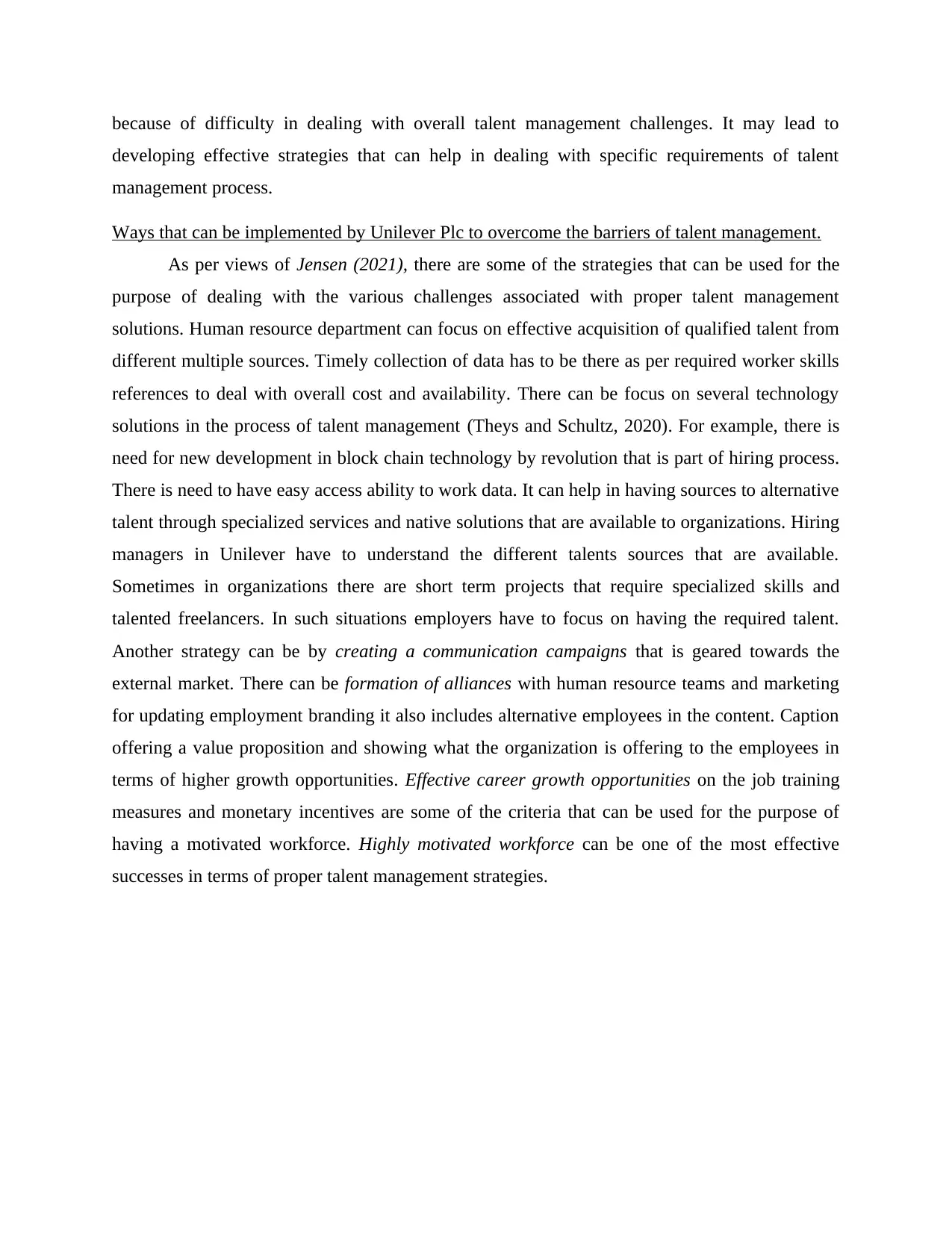
because of difficulty in dealing with overall talent management challenges. It may lead to
developing effective strategies that can help in dealing with specific requirements of talent
management process.
Ways that can be implemented by Unilever Plc to overcome the barriers of talent management.
As per views of Jensen (2021), there are some of the strategies that can be used for the
purpose of dealing with the various challenges associated with proper talent management
solutions. Human resource department can focus on effective acquisition of qualified talent from
different multiple sources. Timely collection of data has to be there as per required worker skills
references to deal with overall cost and availability. There can be focus on several technology
solutions in the process of talent management (Theys and Schultz, 2020). For example, there is
need for new development in block chain technology by revolution that is part of hiring process.
There is need to have easy access ability to work data. It can help in having sources to alternative
talent through specialized services and native solutions that are available to organizations. Hiring
managers in Unilever have to understand the different talents sources that are available.
Sometimes in organizations there are short term projects that require specialized skills and
talented freelancers. In such situations employers have to focus on having the required talent.
Another strategy can be by creating a communication campaigns that is geared towards the
external market. There can be formation of alliances with human resource teams and marketing
for updating employment branding it also includes alternative employees in the content. Caption
offering a value proposition and showing what the organization is offering to the employees in
terms of higher growth opportunities. Effective career growth opportunities on the job training
measures and monetary incentives are some of the criteria that can be used for the purpose of
having a motivated workforce. Highly motivated workforce can be one of the most effective
successes in terms of proper talent management strategies.
developing effective strategies that can help in dealing with specific requirements of talent
management process.
Ways that can be implemented by Unilever Plc to overcome the barriers of talent management.
As per views of Jensen (2021), there are some of the strategies that can be used for the
purpose of dealing with the various challenges associated with proper talent management
solutions. Human resource department can focus on effective acquisition of qualified talent from
different multiple sources. Timely collection of data has to be there as per required worker skills
references to deal with overall cost and availability. There can be focus on several technology
solutions in the process of talent management (Theys and Schultz, 2020). For example, there is
need for new development in block chain technology by revolution that is part of hiring process.
There is need to have easy access ability to work data. It can help in having sources to alternative
talent through specialized services and native solutions that are available to organizations. Hiring
managers in Unilever have to understand the different talents sources that are available.
Sometimes in organizations there are short term projects that require specialized skills and
talented freelancers. In such situations employers have to focus on having the required talent.
Another strategy can be by creating a communication campaigns that is geared towards the
external market. There can be formation of alliances with human resource teams and marketing
for updating employment branding it also includes alternative employees in the content. Caption
offering a value proposition and showing what the organization is offering to the employees in
terms of higher growth opportunities. Effective career growth opportunities on the job training
measures and monetary incentives are some of the criteria that can be used for the purpose of
having a motivated workforce. Highly motivated workforce can be one of the most effective
successes in terms of proper talent management strategies.
⊘ This is a preview!⊘
Do you want full access?
Subscribe today to unlock all pages.

Trusted by 1+ million students worldwide
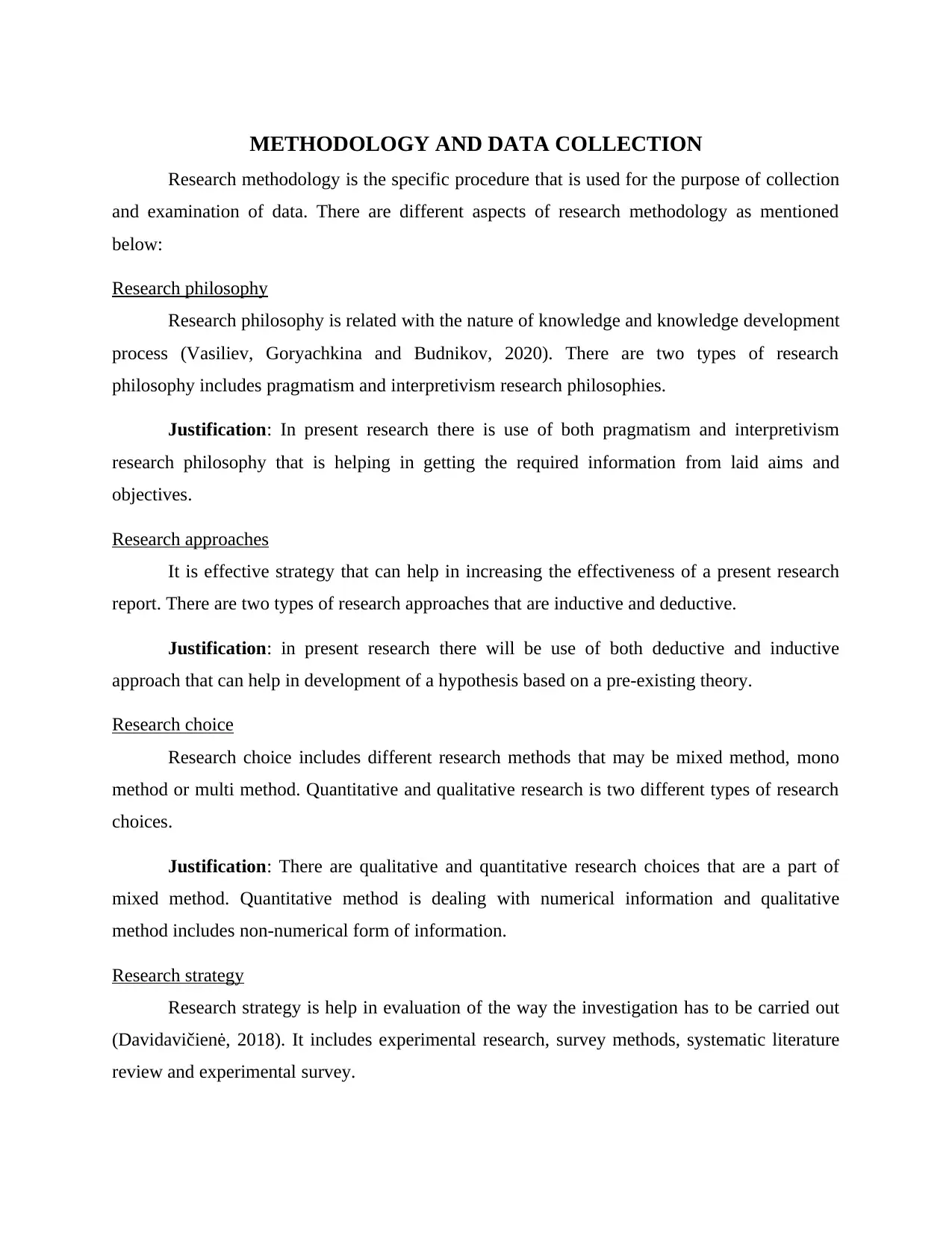
METHODOLOGY AND DATA COLLECTION
Research methodology is the specific procedure that is used for the purpose of collection
and examination of data. There are different aspects of research methodology as mentioned
below:
Research philosophy
Research philosophy is related with the nature of knowledge and knowledge development
process (Vasiliev, Goryachkina and Budnikov, 2020). There are two types of research
philosophy includes pragmatism and interpretivism research philosophies.
Justification: In present research there is use of both pragmatism and interpretivism
research philosophy that is helping in getting the required information from laid aims and
objectives.
Research approaches
It is effective strategy that can help in increasing the effectiveness of a present research
report. There are two types of research approaches that are inductive and deductive.
Justification: in present research there will be use of both deductive and inductive
approach that can help in development of a hypothesis based on a pre-existing theory.
Research choice
Research choice includes different research methods that may be mixed method, mono
method or multi method. Quantitative and qualitative research is two different types of research
choices.
Justification: There are qualitative and quantitative research choices that are a part of
mixed method. Quantitative method is dealing with numerical information and qualitative
method includes non-numerical form of information.
Research strategy
Research strategy is help in evaluation of the way the investigation has to be carried out
(Davidavičienė, 2018). It includes experimental research, survey methods, systematic literature
review and experimental survey.
Research methodology is the specific procedure that is used for the purpose of collection
and examination of data. There are different aspects of research methodology as mentioned
below:
Research philosophy
Research philosophy is related with the nature of knowledge and knowledge development
process (Vasiliev, Goryachkina and Budnikov, 2020). There are two types of research
philosophy includes pragmatism and interpretivism research philosophies.
Justification: In present research there is use of both pragmatism and interpretivism
research philosophy that is helping in getting the required information from laid aims and
objectives.
Research approaches
It is effective strategy that can help in increasing the effectiveness of a present research
report. There are two types of research approaches that are inductive and deductive.
Justification: in present research there will be use of both deductive and inductive
approach that can help in development of a hypothesis based on a pre-existing theory.
Research choice
Research choice includes different research methods that may be mixed method, mono
method or multi method. Quantitative and qualitative research is two different types of research
choices.
Justification: There are qualitative and quantitative research choices that are a part of
mixed method. Quantitative method is dealing with numerical information and qualitative
method includes non-numerical form of information.
Research strategy
Research strategy is help in evaluation of the way the investigation has to be carried out
(Davidavičienė, 2018). It includes experimental research, survey methods, systematic literature
review and experimental survey.
Paraphrase This Document
Need a fresh take? Get an instant paraphrase of this document with our AI Paraphraser
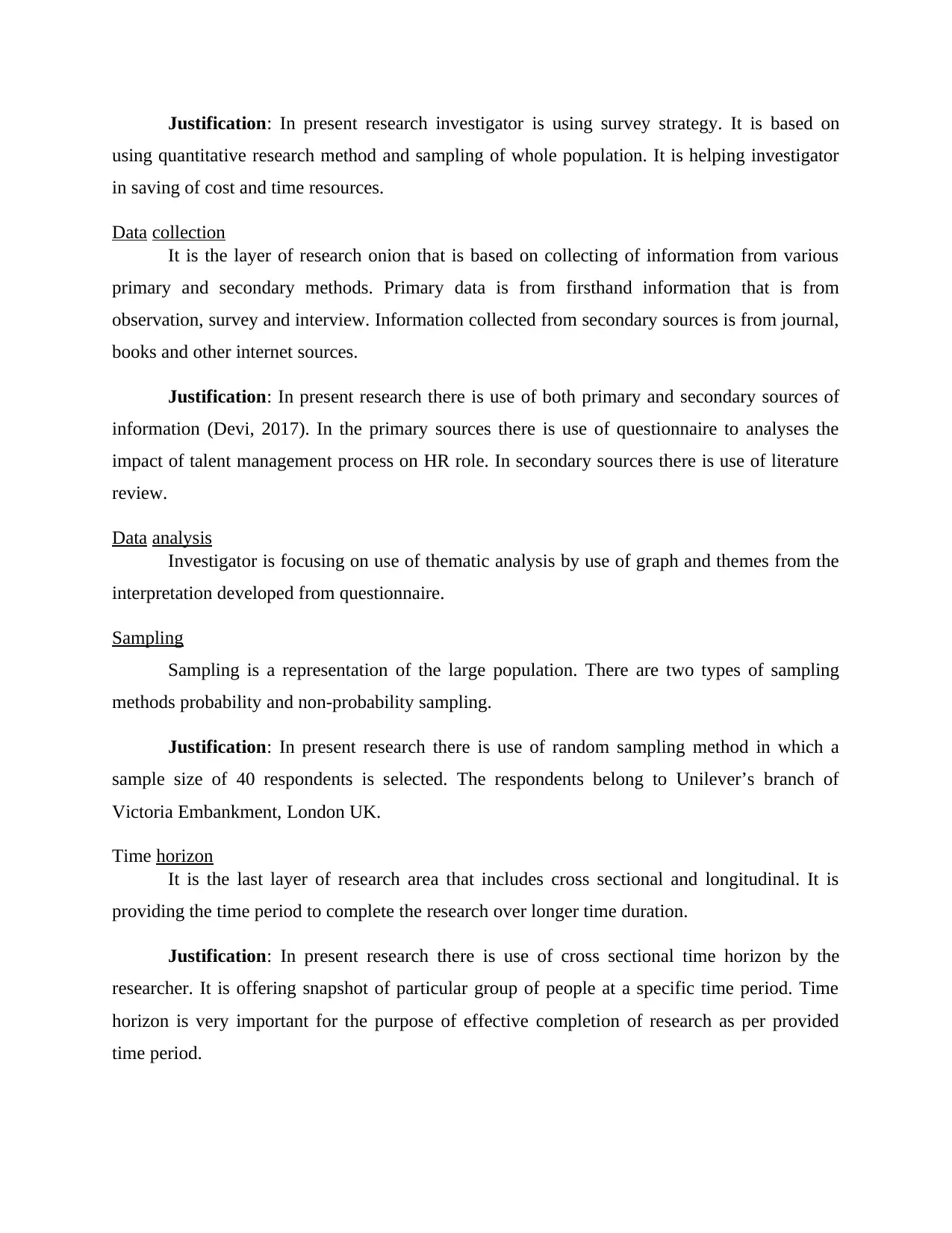
Justification: In present research investigator is using survey strategy. It is based on
using quantitative research method and sampling of whole population. It is helping investigator
in saving of cost and time resources.
Data collection
It is the layer of research onion that is based on collecting of information from various
primary and secondary methods. Primary data is from firsthand information that is from
observation, survey and interview. Information collected from secondary sources is from journal,
books and other internet sources.
Justification: In present research there is use of both primary and secondary sources of
information (Devi, 2017). In the primary sources there is use of questionnaire to analyses the
impact of talent management process on HR role. In secondary sources there is use of literature
review.
Data analysis
Investigator is focusing on use of thematic analysis by use of graph and themes from the
interpretation developed from questionnaire.
Sampling
Sampling is a representation of the large population. There are two types of sampling
methods probability and non-probability sampling.
Justification: In present research there is use of random sampling method in which a
sample size of 40 respondents is selected. The respondents belong to Unilever’s branch of
Victoria Embankment, London UK.
Time horizon
It is the last layer of research area that includes cross sectional and longitudinal. It is
providing the time period to complete the research over longer time duration.
Justification: In present research there is use of cross sectional time horizon by the
researcher. It is offering snapshot of particular group of people at a specific time period. Time
horizon is very important for the purpose of effective completion of research as per provided
time period.
using quantitative research method and sampling of whole population. It is helping investigator
in saving of cost and time resources.
Data collection
It is the layer of research onion that is based on collecting of information from various
primary and secondary methods. Primary data is from firsthand information that is from
observation, survey and interview. Information collected from secondary sources is from journal,
books and other internet sources.
Justification: In present research there is use of both primary and secondary sources of
information (Devi, 2017). In the primary sources there is use of questionnaire to analyses the
impact of talent management process on HR role. In secondary sources there is use of literature
review.
Data analysis
Investigator is focusing on use of thematic analysis by use of graph and themes from the
interpretation developed from questionnaire.
Sampling
Sampling is a representation of the large population. There are two types of sampling
methods probability and non-probability sampling.
Justification: In present research there is use of random sampling method in which a
sample size of 40 respondents is selected. The respondents belong to Unilever’s branch of
Victoria Embankment, London UK.
Time horizon
It is the last layer of research area that includes cross sectional and longitudinal. It is
providing the time period to complete the research over longer time duration.
Justification: In present research there is use of cross sectional time horizon by the
researcher. It is offering snapshot of particular group of people at a specific time period. Time
horizon is very important for the purpose of effective completion of research as per provided
time period.
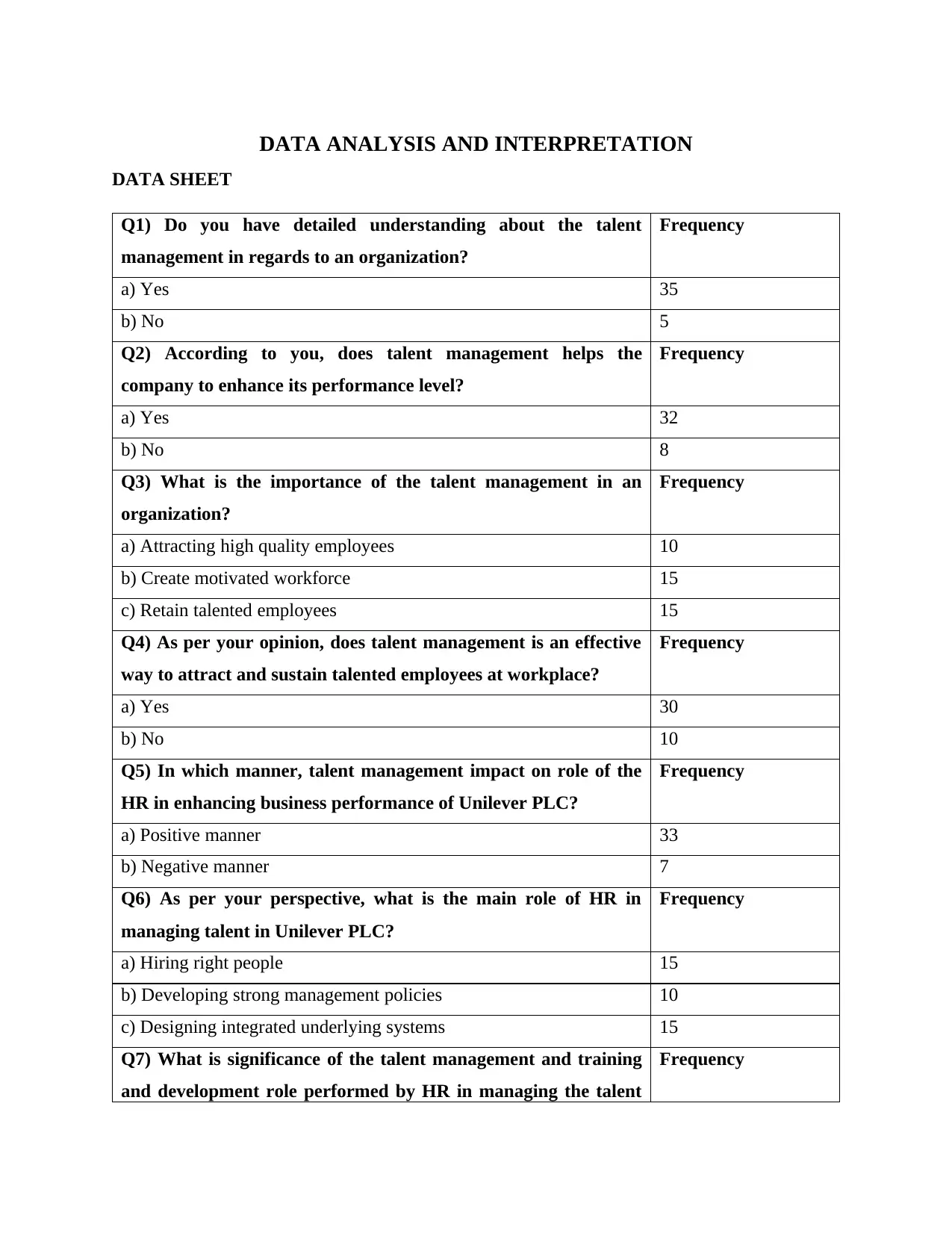
DATA ANALYSIS AND INTERPRETATION
DATA SHEET
Q1) Do you have detailed understanding about the talent
management in regards to an organization?
Frequency
a) Yes 35
b) No 5
Q2) According to you, does talent management helps the
company to enhance its performance level?
Frequency
a) Yes 32
b) No 8
Q3) What is the importance of the talent management in an
organization?
Frequency
a) Attracting high quality employees 10
b) Create motivated workforce 15
c) Retain talented employees 15
Q4) As per your opinion, does talent management is an effective
way to attract and sustain talented employees at workplace?
Frequency
a) Yes 30
b) No 10
Q5) In which manner, talent management impact on role of the
HR in enhancing business performance of Unilever PLC?
Frequency
a) Positive manner 33
b) Negative manner 7
Q6) As per your perspective, what is the main role of HR in
managing talent in Unilever PLC?
Frequency
a) Hiring right people 15
b) Developing strong management policies 10
c) Designing integrated underlying systems 15
Q7) What is significance of the talent management and training
and development role performed by HR in managing the talent
Frequency
DATA SHEET
Q1) Do you have detailed understanding about the talent
management in regards to an organization?
Frequency
a) Yes 35
b) No 5
Q2) According to you, does talent management helps the
company to enhance its performance level?
Frequency
a) Yes 32
b) No 8
Q3) What is the importance of the talent management in an
organization?
Frequency
a) Attracting high quality employees 10
b) Create motivated workforce 15
c) Retain talented employees 15
Q4) As per your opinion, does talent management is an effective
way to attract and sustain talented employees at workplace?
Frequency
a) Yes 30
b) No 10
Q5) In which manner, talent management impact on role of the
HR in enhancing business performance of Unilever PLC?
Frequency
a) Positive manner 33
b) Negative manner 7
Q6) As per your perspective, what is the main role of HR in
managing talent in Unilever PLC?
Frequency
a) Hiring right people 15
b) Developing strong management policies 10
c) Designing integrated underlying systems 15
Q7) What is significance of the talent management and training
and development role performed by HR in managing the talent
Frequency
⊘ This is a preview!⊘
Do you want full access?
Subscribe today to unlock all pages.

Trusted by 1+ million students worldwide
1 out of 32
Related Documents
Your All-in-One AI-Powered Toolkit for Academic Success.
+13062052269
info@desklib.com
Available 24*7 on WhatsApp / Email
![[object Object]](/_next/static/media/star-bottom.7253800d.svg)
Unlock your academic potential
Copyright © 2020–2026 A2Z Services. All Rights Reserved. Developed and managed by ZUCOL.




